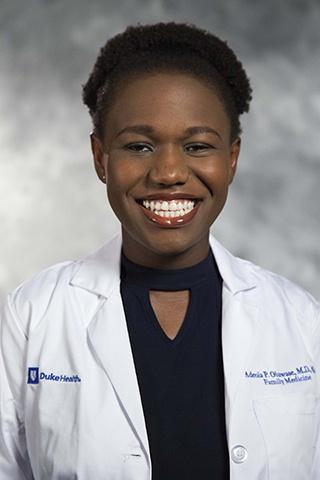Community Engagement: A Rewarding Endeavor for Residents, Health institutions and the Community
During one of our last monthly community walks before the statewide lockdown for COVID-19, Lorna (not real name) and I brought up the rear. Our paces were perfectly matched; she, an elderly woman walking intentionally and carefully, and me, a young mother, pushing a double stroller with two kids. Our conversations ranged from our favorite things to do in Durham to her life as the partner of a diplomat and all the countries in which she has lived, to my life as a medical resident in Durham. We talked about her children and grandchildren, her commitment to a healthy lifestyle, and her desire to maximize the time and quality of time she has with her family. Seeing us from afar, you would think we had known each other for years; in actuality, we had just met that morning.
This community walk is among the unique opportunities for community involvement during my training at the Duke Family Medicine Residency. At the beginning of residency, I had attended community meetings where we discussed issues most concerning to community members. These discussions not only highlighted challenges but also focused on ways to organize, influence policy and share available resources to combat them. These meetings were eye-opening for me as I got to explore, alongside other community members and organizations, issues that were nearest and dearest to the heart of the community. I personally explored ways to help make our community a better, healthier and more inclusive place for everyone.
However, I soon became immersed in various residency requirements and such meetings were no longer commonplace in my schedule. Most of us came into medicine with a strong desire to help and make our community better, but the rigors of medical school, residency and clinical practice can often make it increasingly difficult for us to engage with our communities. However, as we learn more about the importance of social determinants of health and the effects of these factors outside of medicine that affect our patients and community’s health, we often realize how important it is that we engage with our communities and find ways to take our medicine and hearts out of the clinic.
'A gift that keeps giving'
On an institutional level, residency programs have a role to play in ensuring that trainees have ample time in their schedule and opportunities to be involved in the community. The past year, I have been fortunate to go into the community as an educator in a local church men’s group and to join a monthly community walk. These have been possible only because my residency program has created opportunities and provided support by giving me protected time in my schedule. As part of our population health curriculum, we are able to engage in a longitudinal, structured community engagement project that spans across a large portion of our residency. Even in the midst of the ongoing pandemic, we have been actively participating in community efforts to expand testing beyond the health system, using region- and state-specific data.
My interactions with members of the community have created avenues for me to have conversations that help to alleviate some concerns about the medical personnel, and health systems, as a whole. I hope that I have been able to model the commitment a lot of us have to collaborate to improve health care and delivery in our communities. These encounters have helped shape my decision to remain in this community as a practicing physician, as I have seen firsthand the various facets of the community’s health care needs.
Becoming more intimately involved with the Durham community is a gift that keeps giving. I meet people like Lorna and develop meaningful relationships. At the same time, my family and I have had opportunities to connect in some of the most beautiful places in Durham and improve our health and wellbeing too.
Adeola Phebean Oluwase, M.D., MSc, is a third-year resident with the Duke Family Medicine Residency Program. Email adeola.awodele@duke.edu with questions.
Editor’s note: Duke Family Medicine residents guest blog every month. Blogs represent the opinion of the author, not the Duke Family Medicine Residency Program, the Department of Family Medicine and Community Health, or Duke University.
